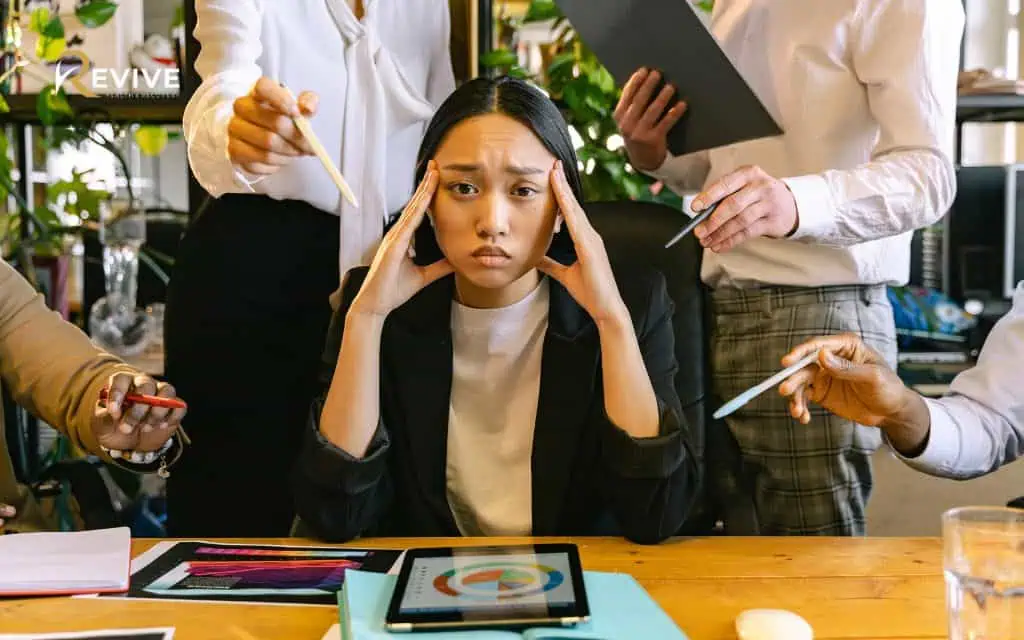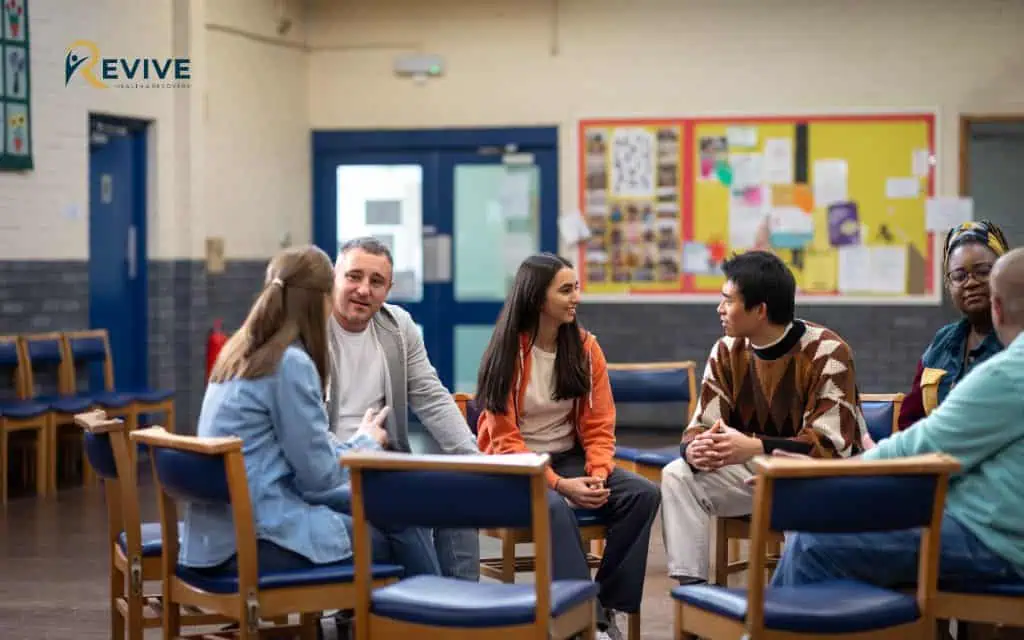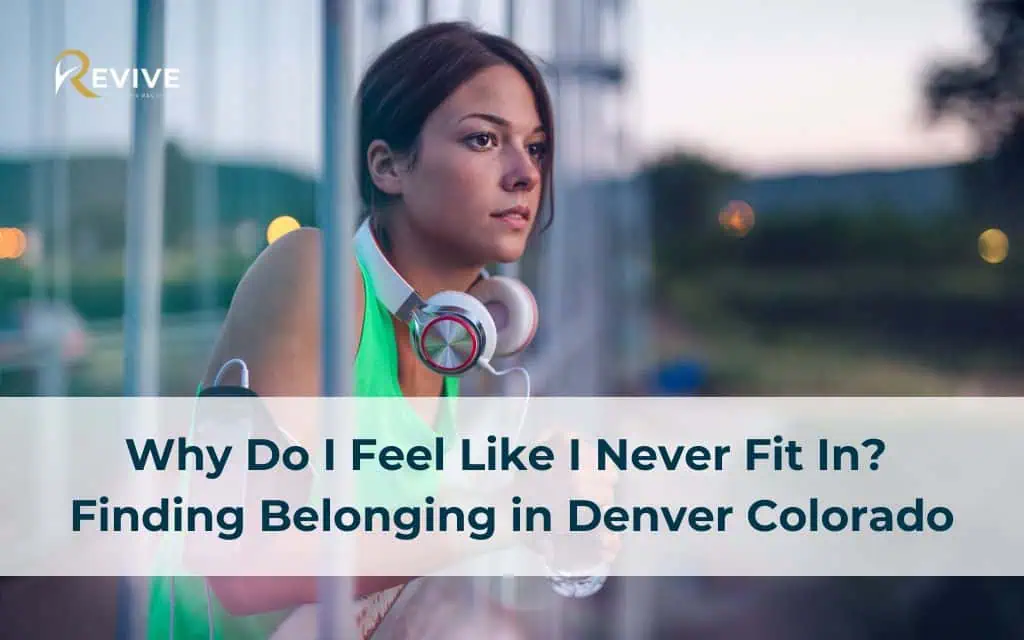The sensation of not belonging of standing at the edge of social circles looking in is a universal human experience that can feel intensely personal and isolating. For many Denver residents, this feeling can be particularly acute as they navigate Colorado’s unique social landscape. Whether you’ve lived here your whole life or recently relocated, questioning “why do I feel like I never fit in?” is both common and deeply human.
This exploration delves into the psychology behind these feelings, their connection to mental health conditions like depression and anxiety, and practical paths toward building genuine belonging. Understanding that these feelings aren’t a personal failing but rather part of our complex social nature is the first step toward transforming isolation into connection. At Revive Health Recovery in Denver, we recognize that the healing journey from outsider to belonging starts with compassionate understanding.
Understanding the Psychology of Not Belonging
The Universal Human Need for Social Connection
Humans are fundamentally social creatures. Our brains are wired for connection. It’s not simply a desire but a biological necessity. Research in social psychology consistently shows that belonging ranks among our most basic needs, alongside food, shelter, and safety.
When this need goes unmet, it triggers a response remarkably similar to physical pain. Brain imaging studies reveal that social rejection activates the same neural pathways as physical injury. This explains why feeling like an outsider can be so genuinely painful.
In Denver’s rapidly evolving community landscape, this biological need for connection can be particularly challenged. The city’s growth has created numerous micro-communities, making it simultaneously easier to find like-minded individuals yet harder to develop deep-rooted connections.
Why Feeling Like an Outsider Is So Common in Modern Society
The digital age has transformed how we connect, especially in tech-forward cities like Denver. While social media promises connection, it often delivers comparison instead showing carefully curated versions of others’ lives that can intensify feelings of not fitting in.
Colorado’s population boom brings unique challenges to social belonging. Many Denver residents are transplants who’ve left established support networks behind. The city welcomed over 15,000 new residents in 2024 alone, creating communities where everyone is simultaneously trying to establish roots.
This mobility, combined with society’s growing emphasis on individualism, creates a perfect storm for feeling disconnected. We’re told to “be yourself” while simultaneously feeling pressure to fit certain social molds, particularly in Denver, where outdoor lifestyle expectations can feel exclusionary to those with different interests or abilities.

The Difference Between Temporary and Chronic Feelings of Not Fitting In
It’s important to distinguish between situational outsider feelings and chronic ones. Most people experience temporary feelings of not belonging when entering new situations such as a new job, neighborhood, or social circle,… This is normal and typically resolves as familiarity grows.
However, persistent feelings of not fitting in anywhere may signal deeper issues. When you consistently ask yourself, “why do I feel like I don’t fit in anywhere in Denver?” despite efforts to connect, it could indicate underlying depression or social anxiety disorder.
At Revive Health Recovery, we’ve observed that chronic feelings of alienation often co-occur with depression symptoms. The relationship is bidirectional—feeling disconnected can contribute to depression, while depression can make it harder to form meaningful connections.
Common Reasons Why People Feel They Don’t Fit In
- Social Anxiety and Fear of Rejection
Social anxiety affects approximately 15% of Colorado residents, slightly higher than the national average. This condition creates a painful cycle: fear of negative evaluation leads to avoidance of social situations, which prevents positive social experiences that would otherwise build confidence.
Many clients at our Denver depression treatment center describe feeling like they’re constantly being judged. This “spotlight effect” causes people to overestimate how much others notice their perceived social missteps or differences.
“Before treatment, I was convinced everyone could see my anxiety and was judging me for it,” shares one Revive Health Recovery client. “Learning that most people are too focused on themselves to notice my nervousness was incredibly liberating.”
- Moving to a New Environment: The Colorado Transplant Experience
Colorado gained over 40,000 new residents in 2024, many settling in Denver. This significant influx means many people are simultaneously trying to establish new social connections, which is a challenging process that naturally involves periods of feeling like an outsider.
The “Colorado native” versus newcomer dynamic can intensify feelings of not belonging. Established residents sometimes express frustration about population growth, inadvertently making transplants feel unwelcome. Meanwhile, newcomers may struggle to understand local cultural norms and social expectations.
Building meaningful connections typically takes 6-9 months in a new location, but Denver’s unique social landscape can extend this timeline. Many transplants report that finding their community takes closer to a year, particularly if they don’t naturally connect with Colorado’s dominant outdoor culture.

- Identity and Value Misalignment with Your Environment
Denver’s culture celebrates certain values and lifestyles such as outdoor recreation, environmental consciousness, and lately, a high-achievement professional culture. These positive attributes can bring feelings of alienation for those whose interests, values, or abilities differ.
One Revive Health client explained: “I moved to Denver for work, but I don’t ski, hike, or mountain bike. Every Monday, conversations revolve around weekend adventures I wasn’t part of. It makes me feel like I don’t belong here.”
The key isn’t necessarily adopting mainstream Colorado interests, but rather finding communities that align with your authentic self. Denver’s growing diversity means there are increasingly varied groups forming around different interests, values, and identities.
- Neurodiversity and Different Social Communication Styles
Undiagnosed neurodivergence such as autism spectrum conditions or ADHD can significantly contribute to feelings of not fitting in. Research suggests that neurodivergent individuals often develop social communication styles that differ from neurotypical expectations.
In Denver, where approximately 1 in 56 adults lives with undiagnosed autism spectrum conditions, many people navigate social situations without understanding why connections feel challenging. This “fitting in” struggle isn’t about personal failure but about neurological differences in how social information is processed.
Revive Health Recovery offers specialized assessments for adults who suspect undiagnosed neurodivergence may be contributing to their sense of alienation. Understanding these differences can transform self-perception from “something’s wrong with me” to “my brain works differently.”
The Mental Health Impact of Not Belonging
The Connection Between Social Belonging and Mental Health
The link between social disconnection and depression is well-established in research. Studies consistently show that perceived social isolation is a stronger predictor of depression than many other risk factors.
Colorado’s depression rates exceed the national average by approximately 7%, with Denver showing particularly concerning trends. While multiple factors contribute to these statistics, the experience of social disconnection ranks among the most significant.
Depression and isolation create a challenging cycle. Depression symptoms like low energy and negative thinking make social connection more difficult, while increased isolation worsens depression. Breaking this cycle often requires professional intervention, which is why depression treatment for social isolation in Denver has become an important specialty at Revive Health Recovery.

How Feeling Like an Outsider Affects Your Self-Esteem
When you consistently feel like you don’t belong, you may start internalizing this experience: believing there’s something inherently wrong with you rather than recognizing it as a temporary situation or a matter of finding the right community.
This internalization damages self-esteem, creating a negative self-perception that further hinders authentic connection. You might begin hiding your true self, believing your authentic personality is what’s causing rejection.
Building healthier self-perception requires challenging these internal narratives. Cognitive Behavioral Therapy (CBT) at Revive Health Recovery helps clients identify and reframe these thought patterns while developing social confidence based on self-acceptance rather than conformity.
The Unique Challenges of Altitude on Mental Health in Colorado
Denver’s mile-high elevation creates unique mental health considerations often overlooked in standard treatment approaches. Research increasingly shows that altitude affects neurotransmitter production, particularly serotonin, which plays a crucial role in mood regulation.
This “mile-high mood effect” may exacerbate feelings of disconnection and depression for some Denver residents. Colorado’s suicide rate that consistently among the highest in the nation has prompted researchers to investigate altitude’s role in mental health outcomes.
At Revive Health Recovery, we incorporate this Colorado-specific knowledge into treatment plans. Understanding how Denver’s elevation might impact your brain chemistry allows for more targeted interventions, whether through therapy, lifestyle modifications, or medication when appropriate.
Building a Sense of Belonging in Denver
Finding Your Authentic Community
Rather than asking yourself “why do I feel like I never fit in” and trying to fit into communities that don’t align with your values or interests, focus on identifying groups where your authentic self is welcomed. Denver offers diverse communities beyond the stereotypical outdoor enthusiast circles.
Some Denver-specific communities worth exploring include:
- Creative collectives like Denver Art Society and Meow Wolf
- Tech meetups and innovation groups
- Cultural heritage organizations
- Special interest clubs ranging from board gaming to urban farming
- Mental health support communities like those at Revive Health Recovery
Remember that quality connections matter more than quantity. Research shows that just 2-3 close relationships provide significant protection against the mental health impacts of social isolation.
Developing Social Skills That Foster Connection
Social connection skills can be learned and strengthened, regardless of your starting point. Key techniques include:
- Active listening: Focusing completely on understanding others rather than planning what to say next
- Authentic self-disclosure: Gradually sharing more personal information as trust builds
- Curiosity: Asking open-ended questions that show genuine interest in others
- Vulnerability: Being willing to show imperfection, which paradoxically tends to increase likability
At Revive Health Recovery, our therapists help clients develop these skills through guided practice in a supportive environment before applying them in everyday social situations.
Embracing Your Uniqueness While Building Bridges
The goal isn’t to erase what makes you different, but to find places where your uniqueness is valued. Sometimes what feels like a liability in one context becomes an asset in another.
Consider reframing your outsider perspective as a strength. People who have felt disconnected often develop valuable qualities like empathy, observational skills, and independent thinking.
Look for ways your differences might contribute positively to groups you join. The perspective of someone who doesn’t automatically “fit in” can bring fresh ideas and approaches that benefit the entire community.
Utilizing Mental Health Resources in Denver
Denver has developed a robust mental health ecosystem in response to Colorado’s high rates of depression and isolation. Resources include:
- Outpatient therapy with specialists in social connection challenges
- Support groups focused on building community
- Mental health apps with Denver-specific resource connections
- Community centers with social inclusion programs
Revive Health Recovery offers specialized support for feeling like an outsider mental health support in Colorado, with programs specifically designed to address the social isolation-depression connection. Call us at (303) 268-4655 to learn about options tailored to your situation.
When Not Fitting In Is Connected to Clinical Depression
Recognizing When Professional Help Is Needed
While temporarily feeling out of place is normal, certain warning signs suggest your experience may require professional support:
- Persistent feelings of worthlessness or hopelessness about belonging
- Withdrawing from social opportunities due to anticipated rejection
- Physical symptoms like disturbed sleep, appetite changes, or low energy
- Thoughts of self-harm or that others would be better off without you
- Using substances to manage the pain of feeling disconnected
If you recognize these signs, reaching out for professional support isn’t admitting defeat, it’s taking a courageous step toward healing. Depression treatment in Denver has evolved to specifically address the connection between social disconnection and mood disorders.
Evidence-Based Treatment Approaches for Depression and Social Anxiety
Several therapeutic approaches have proven particularly effective for addressing the depression-isolation cycle:
- Cognitive Behavioral Therapy (CBT) helps identify and challenge thought patterns that maintain feelings of not belonging. For example, catastrophizing a minor social misstep or mind-reading negative thoughts you assume others have about you.
- Interpersonal Therapy (IPT) specifically targets relationship patterns and communication styles that may contribute to disconnection. This approach is particularly effective for those whose not fitting in feelings stem from relationship difficulties.
- Medication may be appropriate when depression or anxiety symptoms are severe enough to interfere with your ability to implement social strategies. The right medication can provide enough symptom relief to enable more effective participation in therapy.
- Group Therapy offers a unique combination of therapeutic intervention and practical social connection experience. Sharing with others who understand the struggle of not belonging creates powerful healing opportunities.
How Revive Health Recovery Addresses Social Disconnection
At Revive Health Recovery, we’ve developed specialized programs for addressing feelings of not fitting in, particularly when they connect to depression or anxiety.
Our approach begins with comprehensive assessment to understand the specific factors contributing to your experience of disconnection. This might include evaluating:
- Depression severity and specific symptoms
- Social anxiety patterns
- Potential undiagnosed neurodivergence
- Denver-specific contextual factors affecting belonging
- Your unique social needs and preferences
Based on this assessment, we create individualized treatment plans that might include individual therapy, group work, medication evaluation, and concrete social skill development. Our understanding of Denver’s unique social landscape allows us to provide locally relevant guidance for building meaningful connections.
5 Reasons to Choose Revive Health Recovery for Depression Treatment
Personalized Care Approach for Colorado Residents
Unlike one-size-fits-all treatment centers, Revive Health Recovery tailors every aspect of care to your specific needs. We recognize that the path to belonging looks different for everyone, especially in Denver’s diverse social environment.
Our treatment plans consider the whole person, not just symptoms, but your values, goals, interests, and life circumstances. This personalization extends to how we address feelings of not belonging, helping you build connection in ways that feel authentic rather than forced.
Flexible Treatment Options That Fit Your Life
Building social connection requires energy, which depression often depletes. Our flexible treatment options make getting help accessible even when you’re struggling:
- Evening program hours for working professionals
- Telehealth options for those with social anxiety
- Outpatient programs at various intensity levels
- Treatment schedules that accommodate Denver’s unique work cultures
This flexibility ensures that treatment supports rather than further complicates your life. Call (303) 268-4655 to discuss options that would work best for your situation.
Compassionate Staff Who Understand Social Belonging Challenges
Our clinical team brings specialized expertise in the connection between social belonging and mental health. Many team members have personal experience with Colorado’s unique social dynamics, allowing them to provide relevant guidance for navigating local communities.
The therapeutic relationship itself provides important connection experience. Our staff creates a welcoming environment where you don’t have to pretend or perform to be accepted; we open an experience that often helps clients recognize that authentic connection is possible.
Evidence-Based Treatment with Measurable Results
Revive Health Recovery’s approach combines the science of effective depression treatment with the art of building social wellness. Our methods are grounded in research-supported techniques with demonstrated effectiveness for addressing both depression and social disconnection.
We regularly measure treatment outcomes to ensure our approaches are working for you. If certain strategies aren’t creating the desired results, we pivotal quickly to find more effective interventions.
Convenient South Denver Location with Community Focus
Our Federal Boulevard location was specifically chosen to provide accessible mental health care to diverse Denver communities. We’re easily reached from most Denver neighborhoods, with public transportation options available.
Beyond physical accessibility, we’ve created a treatment environment that feels welcoming to people from all backgrounds and life experiences. Feeling like you belong begins the moment you enter our doors.
FAQs About Question “Why Do I Feel Like I Never Fit in”
Is feeling like I don’t belong anywhere a sign of depression?
Persistent feelings of not belonging can indeed signal depression, though they can also emerge from other factors like recent relocation or social anxiety. In Colorado, where many residents are transplants, temporary feelings of disconnection are common during adjustment periods.
However, when these feelings persist despite efforts to connect, or are accompanied by other symptoms like persistent sadness, sleep changes, or loss of interest in previously enjoyed activities, depression may be involved. Revive Health Recovery offers comprehensive assessments to determine whether your experience of not fitting in relates to depression or other factors. Contact us at (303) 268-4655 for a consultation.
How long does it typically take to build a sense of belonging after moving to Colorado?
Most people begin developing meaningful connections within 3-6 months of relocating to Colorado, though building deeper belonging typically takes 9-12 months or longer. Denver’s unique social dynamics, including the prominence of outdoor culture and the large number of fellow transplants, can make this process more complex than in other locations.
Factors affecting this timeline include your efforts to engage with communities, personality factors, previous relocation experiences, and whether you’re dealing with conditions like depression or anxiety. Revive Health Recovery’s programs can help accelerate this process through targeted interventions that address both psychological barriers to connection and practical strategies for community building specific to Denver’s social landscape.
Can therapy really help me feel more connected to others?
Yes, therapy has proven remarkably effective for addressing feelings of disconnection, particularly when those feelings connect to depression, anxiety, or unrecognized neurodivergence. Treatment approaches like Cognitive Behavioral Therapy can transform how you perceive social situations and your place within them.
At Revive Health Recovery, our clients regularly report significant improvements in their sense of belonging through our specialized programs. Therapy helps by addressing both internal barriers (like negative thought patterns or social anxiety) and external factors (like skill development and community-finding strategies). Our Denver-focused approach ensures that guidance is relevant to building connection specifically in Colorado’s unique social environment.
Is my feeling of not fitting in related to Colorado’s unique culture?
Colorado’s distinctive culture which is characterized by outdoor recreation enthusiasm, environmental consciousness, and lately, a high-achievement professional ethos can indeed contribute to feeling like an outsider for those whose interests or values differ. Denver’s rapid growth has intensified this dynamic, creating environments where both newcomers and longtime residents can feel displaced.
This doesn’t mean you can’t find belonging in Colorado. Rather than trying to conform to a culture that doesn’t resonate with you, Revive Health Recovery helps clients identify communities that align with their authentic selves. Denver’s growth has actually increased diversity of communities and interests, creating more opportunities to find your niche without compromising your identity.
How do I know if my difficulty connecting with others is due to social anxiety or something else?
Social anxiety specifically involves fear of judgment or negative evaluation in social situations, often leading to avoidance behaviors or significant distress during social interactions. Signs that social anxiety might be affecting your sense of belonging include physical symptoms like racing heart or nausea before social events, excessive worry about saying the “wrong thing,” and analyzing interactions extensively afterward.
Other factors that can create connection difficulties include depression, undiagnosed neurodivergence, or simply being in environments misaligned with your values and interests. Revive Health Recovery provides comprehensive assessments to identify the specific factors affecting your social experience and develop targeted interventions. Our Denver-based clinicians understand the local context that might impact your sense of belonging in Colorado communities.
Conclusion
Feeling like you never fit in doesn’t mean there’s something inherently wrong with you. This experience while painful is both common and addressable. Understanding the psychological, social, and sometimes biological factors contributing to these feelings is the first step toward transformation.
For Denver residents, the journey to belonging may include additional challenges related to our city’s unique social landscape, rapid growth, and even the physiological impacts of mile-high living. However, these challenges can be overcome with the right support and strategies.
At Revive Health Recovery, we specialize in helping Denver residents move from isolation to connection, particularly when depression or anxiety complicate this journey. Our programs combine evidence-based psychological interventions with practical strategies for building meaningful community in Colorado’s distinctive environment.
Don’t let the question “why do I feel like I never fit in?” define your Denver experience. With appropriate support, you can develop the sense of belonging that every human naturally seeks. Contact Revive Health Recovery today at (303) 268-4655 or email contact@revivehealthrecovery.com to schedule a consultation and take the first step toward building genuine connection in your Denver community.



